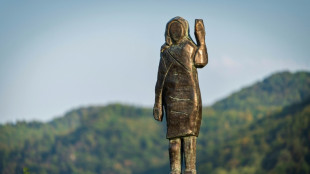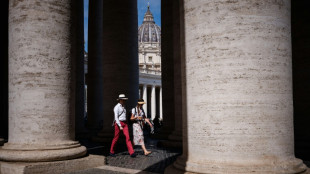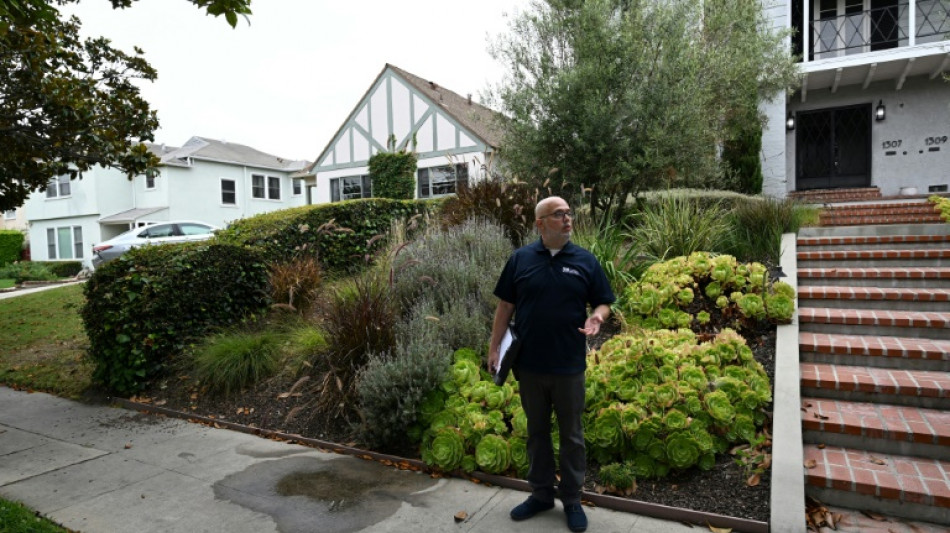
-
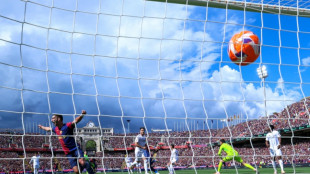 How Flick's Barca wrestled La Liga back from Real Madrid
How Flick's Barca wrestled La Liga back from Real Madrid
-
Kiwi Fox, local hero Smalley make most of late PGA calls

-
 Oil prices fall on hopes for Iran nuclear deal
Oil prices fall on hopes for Iran nuclear deal
-
European walkout after late Infantino delays FIFA Congress

-
 Eurovision: the grand final line-up
Eurovision: the grand final line-up
-
Yamal pearl seals Barcelona La Liga title triumph at Espanyol

-
 Rubio has no high expectations for Ukraine-Russia talks
Rubio has no high expectations for Ukraine-Russia talks
-
Milkshakes, opera and lust as Eurovision semi votes counted

-
 Trump admin leaves door open for tougher PFAS drinking water standards
Trump admin leaves door open for tougher PFAS drinking water standards
-
No.1 Scheffler, No.3 Schauffele blast PGA over "mud balls"

-
 Eric Trump says father's energy policies will help crypto
Eric Trump says father's energy policies will help crypto
-
US rests case in landmark Meta antitrust trial

-
 Alba inks Inter Miami extension to 2027
Alba inks Inter Miami extension to 2027
-
Real Madrid's Asencio wants 'presumption of innocence' in underage sex video case

-
 Brazil president leads final farewell to Uruguay's Mujica
Brazil president leads final farewell to Uruguay's Mujica
-
Gaza strikes kill 120 as Hamas says aid entry 'minimum requirement' for talks

-
 Donald edges Bradley as Ryder Cup captains contend at PGA
Donald edges Bradley as Ryder Cup captains contend at PGA
-
Eurovision semi starts with milkshake and space odyssey

-
 Ruud mesmerised by 'next level' Sinner in Rome destruction
Ruud mesmerised by 'next level' Sinner in Rome destruction
-
Coinbase expects data breach to cost it up to $400 mn

-
 Eagle chip helps Gerard grabs PGA Championship lead with 66
Eagle chip helps Gerard grabs PGA Championship lead with 66
-
England great Anderson set for Lancashire return

-
 Sinner sends message by demolishing Ruud to reach Italian Open semis
Sinner sends message by demolishing Ruud to reach Italian Open semis
-
Rubio says no high expectations for Ukraine-Russia talks in Turkey

-
 NFL owners to vote on allowing players at 2028 Olympics
NFL owners to vote on allowing players at 2028 Olympics
-
Sinner demolishes Ruud to reach Italian Open semi-finals

-
 Rashford to miss final two games of Aston Villa's season
Rashford to miss final two games of Aston Villa's season
-
70 South African white rhinos to be relocated to Rwanda

-
 West Indies issue LA 2028 Olympic cricket plea
West Indies issue LA 2028 Olympic cricket plea
-
Gaza strikes kill over 100 as Hamas says aid entry 'minimum requirement' for talks

-
 Nantes striker Mohamed fined for sitting out game marking anti-homophobia campaign
Nantes striker Mohamed fined for sitting out game marking anti-homophobia campaign
-
Hamilton admits he underestimated Ferrari challenge

-
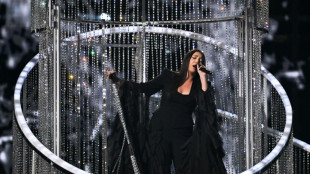 Israel in Eurovision spotlight at second semi-final
Israel in Eurovision spotlight at second semi-final
-
England's Donald shares PGA Championship lead with 67

-
 WTA president Simon to step down in December
WTA president Simon to step down in December
-
Antonelli draws on Hamilton's heart-warming message for inspiration

-
 South African rugby mourns death of Cornal Hendricks at 37
South African rugby mourns death of Cornal Hendricks at 37
-
Cool Piastri plays down prospects of more McLaren domination

-
 Hadid sister helps launch Palestinian film streaming site
Hadid sister helps launch Palestinian film streaming site
-
Groves wins neutralised Giro sixth stage, former winner Hindley abandons

-
 Knight eager to be 'one of the girls' under new England captain Sciver-Brunt
Knight eager to be 'one of the girls' under new England captain Sciver-Brunt
-
Ukraine sends team for Russia talks, downplays expectations

-
 Paolini delights home crowd by reaching 'dream' Italian Open final
Paolini delights home crowd by reaching 'dream' Italian Open final
-
Guyana says soldiers attacked in disputed border region with Venezuela

-
 Paolini delights home crowd by reaching Italian Open final
Paolini delights home crowd by reaching Italian Open final
-
Combs's ex Cassie faces intense cross-examination

-
 US set to lose $12.5 bn in foreign tourism in 2025: industry
US set to lose $12.5 bn in foreign tourism in 2025: industry
-
Ex-Olympic swim champion Agnel to go on trial over rape allegations

-
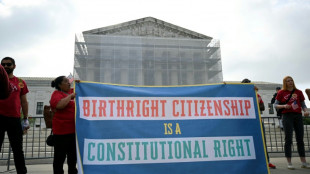 US Supreme Court weighs judicial checks on Trump with birthright case
US Supreme Court weighs judicial checks on Trump with birthright case
-
English trio among early contenders at PGA Championship


'Water police' patrol drought-hit Los Angeles streets
Damon Ayala patrols the streets of drought-stricken Los Angeles every day, inspecting the sidewalks. Each time he sees a puddle, he stops.
He is part of the city's Department of Water and Power team, which looks into hundreds of community complaints filed by neighbors each week about water waste.
"It's not extreme, but it's something that we want them to take a look at," he says of one pool of water.
"Looks like they have drip irrigation on this side. So there might be just a broken connector."
Ayala's patrol comes as California and the western United States are in the grip of a severe, years-long drought.
Scientists say global warming driven by human activity, including the unchecked burning of fossil fuels, is creating a greater number of extreme events.
With reservoirs and rivers at historic lows, Los Angeles authorities have brought in water restrictions, such as limiting lawn irrigation to as little as eight minutes, twice per week.
Ayala notes down the addresses of properties where he finds evidence of infringement. The first violation prompts a warning.
"A lot of times they don't know about the ordinance, and that's our job to educate them," he said.
Repeat offenders are fined between $200 and $600.
"We're not looking really for their money -- that doesn't get us more water. We're trying to get behavioral change," he said.
"So that way we can capture the water savings from making those changes."
After a fifth infraction, a device is installed which physically restricts a household's supply, although Ayala says that step has rarely been necessary.
"We've been in serious drought situations in the past in the city of Los Angeles, and its citizens responded," he said.
"And we expect them to respond this time around too."
- 'Obvious choice' -
The water department says it is beginning to see results.
Officials noted a reduction in residential water demand in June, compared to the same month last year.
But as the drought worsens, more permanent changes to the city's landscape could become necessary.
Famous for its rows of palm trees, Los Angeles has also traditionally been known for its lush, green lawns, maintained with automatic sprinklers.
Residents are increasingly replacing their thirsty lawns with plants native to this desert region.
"When we think of how much water gets used in a residential setting, over 50 per cent is actually used outdoors," said Pamela Berstler, executive director of urban landscaping firm G3 Garden Group.
She and her colleague Marianne Simon teach classes as part of a city program to encourage Angelenos to trade in their lawns for alternatives.
South Los Angeles residents Gabriel Golden and Danielle Koplinkase, joined the program a few years ago.
"The environmental impact of watering a lawn, not only in the midst of a draught but also living in a very dry climate, made this an obvious choice," they said.
"We also sought to inspire our neighbors and community by going to a drought tolerant and native garden."
Native plants such as California oak, and flowers that only require a few drops of water each week to thrive, now adorn the couple's garden.
"There are parts of southern California where they have cut the water down to one day of watering per week," said Simon.
"And the reality is that these kinds of gardens would be fine on that amount of water -- in fact, could do with less -- but our traditional lawns can't survive on that."
- 'Short-sighted' -
Other popular alternatives include artificial lawns or gravel, although Simon stresses the environmental benefits of maintaining some form of vegetation.
"The problem is that we are so short-sighted and so narrow in our vision that all we can see is saving the water," she said.
A planted area can be cooler by "easily 20 degrees" Fahrenheit (10 degrees Celsius) than a gravel replacement, and "there's the ability to hold on to rain when we do get it so that we can replenish aquifers."
As she speaks, a nearby sprinkler turns on under the blazing California sun, spraying a lawn during prohibited hours.
With the thermometer hovering around 97 degrees F, water falling on the wilted, uneven grass and trickling down the sidewalk evaporates within minutes.
"It's heartbreaking to see, but it's also a lesson," she said, pointing to the withered garden.
"That should be our past and this should be our future," Simon added, looking back at the native plants.
L.Mason--AMWN
